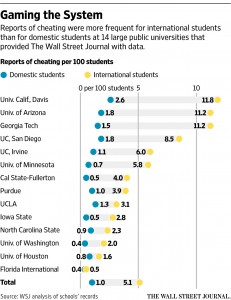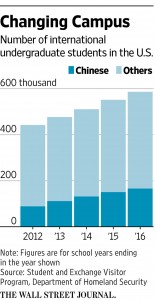A Wall Street Journal analysis of data from more than a dozen large U.S. public universities found that in the 2014-15 school year, the schools recorded 5.1 reports of alleged cheating for every 100 international students. They recorded only one such report per 100 domestic students.
Citing the Freedom of Information Act, the Journal asked 50 public universities with large international student enrollments how many reports of alleged academic-integrity violations they recorded for international undergraduates and how many involved U.S. undergraduates. Many universities said they didn’t have such information or it would be too onerous to track down, but 14 did provide the full records for the 2014-15 academic year.
 Faculty and domestic students interviewed by the Journal said it appears that substantial numbers of international students either don’t comprehend or don’t accept U.S. standards of academic integrity. They also singled out Chinese students.
Faculty and domestic students interviewed by the Journal said it appears that substantial numbers of international students either don’t comprehend or don’t accept U.S. standards of academic integrity. They also singled out Chinese students.
Qingwen Fan, president of the Chinese Students and Scholars Association at the University of California, Davis, told the Journal that some students in China get burned out by cramming in high school, and when they get to university:
“….they want to enjoy life. They are busy with social stuff and everything they missed before. They start to cheat. They didn’t put in the time but they want to pass the test. That is kind of a cultural thing.”
Ms. Fan also said there was a “concept difference” in how Americans and Chinese students “define cheating” as she said it is common for the latter to collaborate on assignments.
Lanqing Wang, a Georgia Institute of Technology electrical-engineering student from Shanghai, said he was distressed by the cheating he sees. He was quoted as saying: “In China, it’s OK to cheat as long as you’re not caught.”
The Journal went on to note that according to Teddi Fishman, director of the International Center for Academic Integrity (ICAI), a nonprofit with offices at Clemson University, about 60% of all students on U.S. campuses admit they cheated at least once in the last year. It is also possible that cheating is more likely to be caught when a student is foreign. After all, a student who can barely speak English, but hands in a skillfully written English-language paper would draw attention. Instructors who also perceive a cheating issue among foreign students might scrutinize their work much more closely.
However, many U.S. universities are now dependent on international students who often pay two to three times the tuition and fees of local U.S. students.
 In the article’s comments section, one person pointed out:
In the article’s comments section, one person pointed out:
“With the international students, it’s a bit more complicated–the best students stay in their home country and what we see largely are second or third tier students that have a bankroll. The schools need the cash and aren’t especially shy about making it clear to teachers that these students need to be kept.”
Another wrote:
“When I was a graduate student 10-15 years ago, I saw lots of cheating and rarely did the professor want to do much. It took more time away from their research to ‘prosecute’ the student to the fullest extent than to just let it go.”
